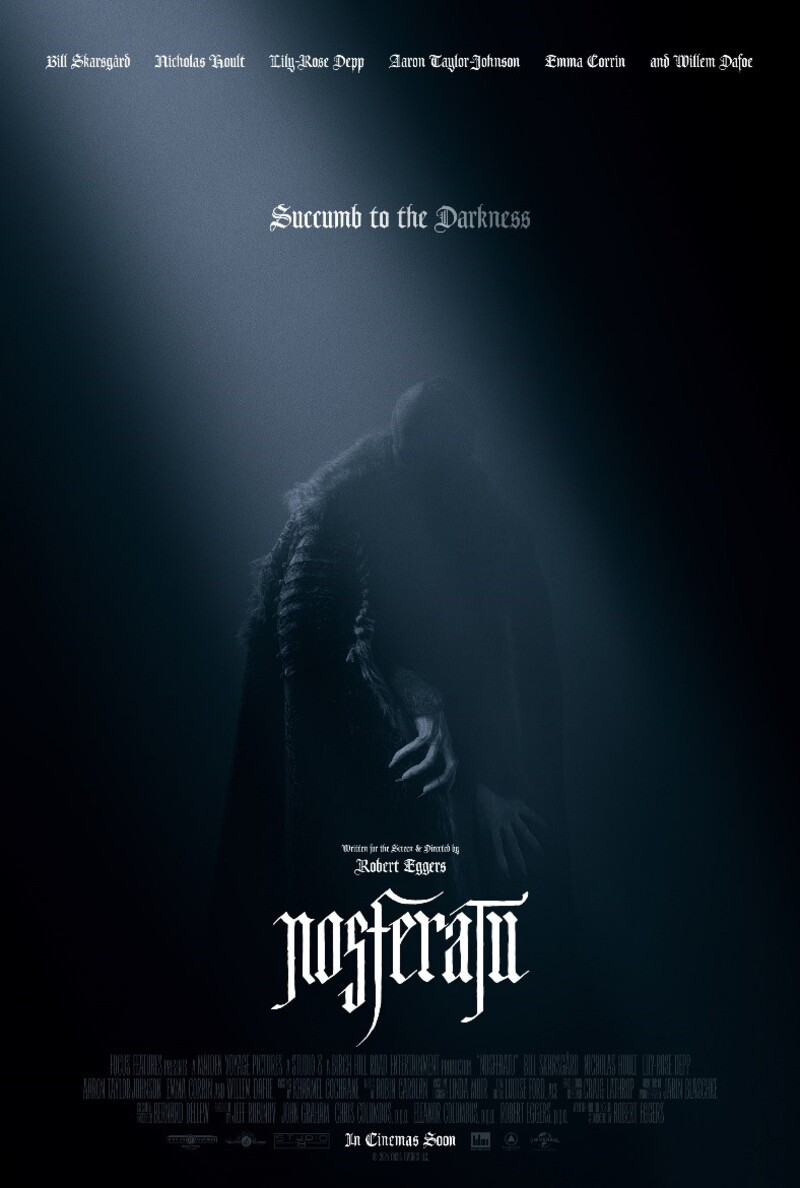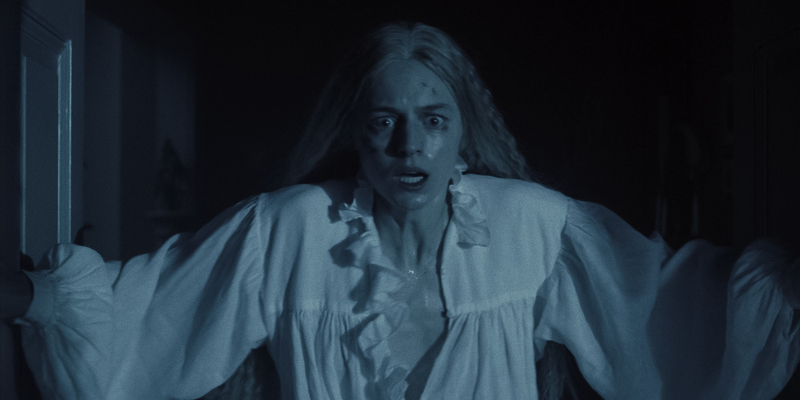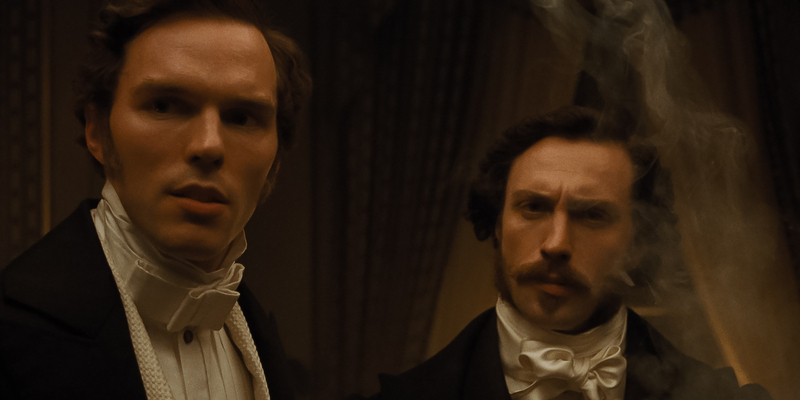
Review by
Eric Hillis
Directed by: Robert Eggers
Starring: Bill Skarsgård, Lily-Rose Depp, Nicholas Hoult, Aaron Taylor-Johnson, Emma Corrin, Ralph Ineson, Simon
McBurney, Willem Dafoe

In 1922 a bunch of tight-fisted Germans made an adaptation of 'Dracula'
without forking out for the rights to Bram Stoker's novel. The result was FW
Murnau's Nosferatu, which immediately found itself in trouble with the Stoker estate, who
ordered all prints of the movie be destroyed. Some prints survived, with
Murnau's film going on to influence a century of vampire cinema. Subsequent
Dracula movies have pulled as much from Murnau's film as from Stoker's
novel, so much so that what we now think of as Dracula lore is a mashup of
elements from Stoker's novel and Murnau's film.
With Dracula now in the public domain, it may seem an odd choice for
writer/director Robert Eggers to remake
Nosferatu rather than simply adapt Dracula, especially given
the latter's more mainstream brand recognition. But there are some key
differences that distinguish Nosferatu from the novel, and
like Werner Herzog's 1979 remake, Eggers carries them over here.

The chief divergence is in centring the Mina Harker surrogate, Ellen,
played here by a miscast Lily Rose-Depp (though not as miscast as
Isabelle Adjani, an actress who hardly screams sexual repression, in
Herzog's version). Ellen is the first character we meet, in a flashback that
sees her visited in a dream by Count Orlok (Bill Skarsgård, who seems
determined to become known as a modern day Lon Chaney with his expanding
roster of heavily made-up ghouls). We then cut to several years later and
find Ellen newly wed to estate agent Thomas (Nicholas Hoult). When
Thomas informs his wife that he is to set off to Transylvania to conclude
the sale of a home to Orlok, Ellen begs him not to leave, but off he
goes.
If you've seen any variation of Nosferatu/Dracula, you'll be familiar with most of what follows. Eggers' film may only be
the third version of Nosferatu, but it's the umpteenth version of Dracula, and it doesn't do enough to distinguish itself from a crowded field.
Eggers adds a sequence involving a late night gypsy ritual, but practically
everything else here is all too familiar. We all have our favourite version
of Dracula (mine is Terence Fisher's, of course) and Eggers'
slavish devotion to the source means we inevitably find ourselves drawing
comparisons to what came before.
There's little to make this one stand out. As Thomas, Hoult delivers one of
the more notable portrayals of the character that originated as the novel's
Jonathan Harker. In his scenes with Orlok, Hoult plays the character with
the sort of terror you would expect in such a scenario, a far cry from the
stiff upper lip of most previous portrayals. As soon as he sets eyes on
Orlok Thomas practically shits himself, as you would. The rest of the cast
fare unfavourably to their various predecessors, with Depp particularly
struggling to deliver the over-written dialogue Eggers lumbers her
with.

Murnau's Nosferatu is best known for giving us the terrifying
version of Orlok played by Max Schreck, all bald head, pointy ears, long
nails and fanged teeth. Herzog ditched the Orlok name in favour of Dracula
but transferred Schreck's look to the even more imposing Klaus Kinski.
Eggers keeps the Orlok name but drops his famous look in favour of something
less animalistic, with Skarsgård's mustachioed Orlok bearing more
resemblance to the cannibalistic antagonist played by Luigi Montefiore in
Joe D'Amato's grindhouse shocker Anthropophagus. Skarsgård's vocals sound like The Count from Sesame Street is he was
a 60 cigs a day man.
Like previous Nosferatus, the romance associated with Count Dracula is dropped in favour of a
primal villain who preys on Ellen more out of insatiable lust than any
romantic desire, describing himself as "merely an appetite," as though he
were a shark in human form. The trouble with this is that the film never
quite convinces us that Ellen is worth making such an arduous trip for -
surely there are some hotties in Transylvania? (I'm reminded of Kurt
Russell's line to James Hong in Big Trouble in Little China: "2000 years, he can't find one broad to fit the bill?").
In the previous two versions of Nosferatu, the bond between Ellen and Orlok was suggested almost exclusively through
imagery, whereas here the two engage in full-on chit chats. The framing of
one particular verbal flirtation is so similar to a famous moment between
Ted Danson and Shelley Long in Cheers that I was expecting
Ellen and Orlok to simultaneously blurt out "Are you as turned on as I am?"
But in trying not to offend modern sensibilities regarding female agency,
the film ties itself in knots regarding the relationship between Ellen and
Orlok, Eggers simultaneously striving to create a sexual heat between the
pair while wary of portraying Ellen as "asking for it." The recent excellent
true crime thriller
The Man in the White Van
did a far more convincing job of suggesting an antagonist summoned
indirectly by a young woman's confused sexual longing.

Eggers' film is symptomatic of the Nolanisation of Hollywood, where
filmmakers follow a depressing compulsion to strip away as many fantastical
elements as they can from the source material. The Count never turns into a
bat here, because in the 21st century we're seemingly all far too cynical
for such hijinks. A far cry from the sumptuous Hammer series, Eggers' Nosferatu
is practically monochromatic in its lack of colour, as though its vampiric
villain has sucked all the life from the print.
Perhaps what's most baffling about Eggers' film is the decision to remake
such a distinctively German movie and populate it with Anglo-American
actors. The action may play out in Germany, but with everyone adopting an
English accent here it's impossible not to think of Eggers'
Nosferatu as simply yet another Dracula adaptation, one that
never quite justifies its existence.


